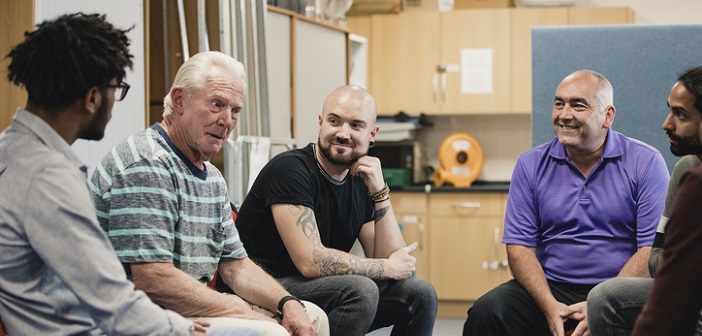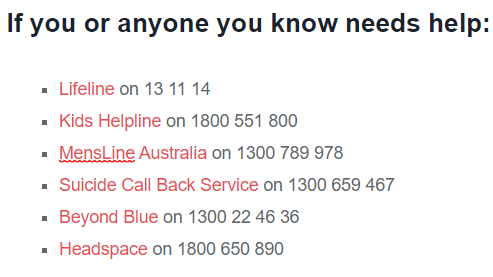It’s officially Men’s Health Week (14-20 June 2021), and joining us for this Q&A article is Springfox chief executive Stuart Taylor. He’s an expert is resilience and well-being as well as an international speaker on resilience.
The Q&A runs through the topic of men’s mental health, something that has risen to the forefront of our discourse but still needs a lot of attention and progress made to remove negative stigma associated. We hope you enjoy the article.
Firstly, do you mind introducing yourself? What do you do?
Almost 20 years ago I formed Springfox, Australia’s leading provider of evidence-based resilience programs for individuals and organisations. After years of working in the corporate world and rapidly climbing the corporate ladder, I found myself on the brink of burnout from work. In 2002 I was diagnosed with a grade 3 brain tumour. Given less than three years to live, I embarked on a personal journey of resilience, and as a result, became a fierce advocate for incorporating cultural practices in the workplace to nurture wellbeing, strengthen mental health and boost performance.
For the last two decades, owing to my own personal experience, I’ve worked with businesses and professionals to build resilience, nurture leadership trust, develop compassionate leadership, prevent burnout, improve psychological safety, and maintain wellbeing and positive mental health.
What are you focusing on for this year’s Men’s Health Week?
This Men’s Health Week, I encourage men to see the benefits of incorporating resilience practices into their everyday lives. Not only do we need to be talking openly about mental health, but many of us could benefit from adopting a few simple practices to help build resilience and prepare for periods when our mental health might be challenged.
Resilience, in part, is the ability to deal with unexpected challenges and difficult situations. But more than that, resilience also strengthens your capacity to not only deal with life’s challenges but bounce forward from them. Resilience protects against overwhelming experiences, can help us maintain balance in our lives during stressful periods, allows us to thrive in life and is vital in protecting ourselves against the development of mental health issues.
Resilience is a learnt skill that’s best built through a number of positive lifestyle practices such as:
- Valuing your health through adequate sleep, good nutrition, exercise and meditation.
- Meditating each day, even if just for a brief period. The act of making this small commitment to yourself can help, whether it is for five minutes or an hour.
- Going to sleep at a regular time each night and averaging 7-8 hours sleep will help reset your body clock and give you the best chance at productivity and general wellbeing.
- Learning to delegate or say no when your plate is full and manage your time effectively by working in time blocks as well as getting up to move your body through the day.
- “Catch, check and change” destructive emotions and negative thoughts.
- Making time for the people and activities you enjoy in your life, no matter what you have on. You can do this by eating a meal with close friends and family.
The discourse around mental health and more specifically, men’s mental health, has improved considerably in the past few years. What do you think can still be done in this area?
While we have absolutely begun to normalise conversations about mental health, if we’re to truly break the stigma around mental illness and make a difference for those suffering, we need to become comfortable with making mental health a topic of everyday conversation and practice. In other words, we must feel empowered to not only reach out and follow up, but to also incorporate practices into our own lives that will help safeguard against challenging periods in our lives. We should be doing more to care for ourselves before a period of mental ill-health strikes. Part of this is recognising that mental health and mental illness is not binary. The entry point to mental illness also happens to be the entry point for good mental health and performance. Having a lot on your plate, might be motivating and being energising. Unfortunately, it’s when the busyness becomes intense and overwhelming that someone might start to slip downwards.
What can we do to help improve the environment for mental health issues?
Many would attribute the rise of mental health issues largely to our high-pressure, always-connected culture that leaves little time for rest – this is particularly pertinent in a workplace environment. What people need to understand is that whilst a worker may develop mental illness prior to or during employment, an unhealthy work environment or a workplace incident can cause considerable stress that exacerbates or contributes to the development of mental health challenges. This can lead to spill over and begin to affect a person’s home life too. At an organisational level, there is a clear duty of care for leaders to look after their people, minimise mental distress and assist those who are suffering. As much as organisation’s have a responsibility to their employers, it’s also important for employees to focus on their own resilience at an individual level – this is important for people to do regardless of what environment they find themselves in.
What would you say to our readers who may know someone who is struggling? What are some tips to reach out and start a healthy conversation?
There are four things to consider when engaging with someone who is showing signs of mental distress:
Timing matters – When choosing the right moment to ask someone how they’re doing, your timing will make a difference in their willingness to open up. Not everyone wants to have a face-to-face conversation, so for some people, talking while participating in a shared activity – like fishing, walking, golfing, or even watching TV – will make it easier to communicate. Choose a moment when you won’t be interrupted, when the conversation won’t be rushed and when you are feeling relaxed and ready to listen.
Be open – Start the conversation with a simple statement to open the discussion. Statements like ‘I’ve noticed you’ve not been yourself recently, or ‘something you’ve said/ done has made me worried about you, can we talk about it?’, are all great ways to gently raise your concerns. Sometimes a simple ‘Are you okay’ will be enough to get someone to share how they’re feeling, but if met with a reply of ‘I’m fine’ you might need to give a broad example of why you’re concerned.
Listen well – When talking about mental health, don’t feel like you need to have a solution to the problem. Listening without judgement or agenda and with empathy can be enough to enable someone to talk about what’s going on. Often, addressing metal health doesn’t have a single solution, but rather is a process that looks a number of elements, so offering ways to ‘fix’ the problem won’t be helpful. Instead, how genuine interest in what is being shared and acknowledge that things are difficult and share your own experiences if relevant.
Be prepared – Often, we reach out with good intentions only to find ourselves seemingly lost for words when we’re opened up to. Avoid this by thinking ahead – are you prepared to have an effective and genuine conversation? If the person is in fact experiencing mental distress, are you equipped to provide them with valuable assistance? Are you aware of your boundaries and responsibilities? Your readiness to ask the question depends on these answers.
How can these steps be taken in an environment like COVID-19 lockdowns? What are some ‘socially distanced’ ways to chat to a friend?
If you live locally, go for a walk. Even during Melbourne’s most recent lockdown, exercising with one person outside of your household (geographic restrictions considered) was allowed. Take advantage of this simple allowance and get outside, walk and talk. Grab a takeaway coffee and open the conversation up.
If you can’t meet face-to-face, phone calls can help. Some people prefer video calls, other prefer just hearing someone’s voice. Work out what works best for your relationship and check in regularly.
Where to next for yourself? What are you focusing on this coming year?
This year we’re working with a number of businesses who are looking to rebuild the resilience of their employees and leadership teams after what was a challenging year of COVID-19 restrictions and disruptions. We’re finding that many businesses are adapting to new ways of working, new market challenges and new systems, and that building resilience and leadership trust is more important than ever before, during this continued period of uncertainty.
On a personal level, I live and breathe the practices I teach as I firmly believe that resilience is a key component to living a successful and fulfilling life. You’ll find me spending time with my family, and enjoying some of the things I truly love in life. Balance is essential!
Any further comments?
I think many people and organisation become preoccupied with performance at all costs and forget to make that journey sustainable. Neglect of self and neglect of co-workers does not lead to a great outcome or a happy life. More and more our focus at Springfox is working with business leaders around how to humanise their organisations to make performance sustainable.
Stuart Taylor, chief executive of Springfox , Australia’s resilience and well-being experts, is an international speaker on the topic of resilience, and how it can be fostered at both an individual and organisational level to boost morale, increase productivity and enhance the overall wellbeing and performance of Australian workers. He is passionate about mental health and well-being in both his personal and professional lives.






